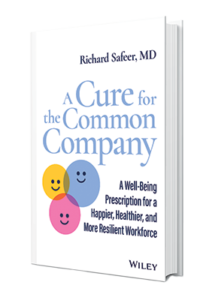What I didn’t expect on my path to becoming a doctor and entering the workforce was how much my job would impact my sleep–specifically, how much of my insomnia would be related to something my boss said or did or didn’t say or do. My wellbeing journey has been a series of enlightenments–“Aha!” moments. It took years of allowing the workplace to interfere with my sleep before I realized I might be the cause of insomnia for others. All of this to say: if we want to bring wellbeing to the workplace, we must know how we’re feeling ourselves.
How am I “doing”? Do you mean, how am I “feeling”? Right now? As I read this post? When was the last time you slowed down to ask yourself how you feel? Are you so busy you can’t slow down to figure out if you’re stressed or relaxed? Happy or sad? Hungry or tired? When people ask you “how are you doing today?” Do you reflexively say “good” when you haven’t even checked in with yourself? When was the last time you read a paragraph only made of questions?
It’s commonplace to answer “good” when asked how you’re feeling. We’ve all answered “good” before. However, how often is that not quite accurate? Maybe it was just a reflex. Maybe you didn’t have time to think about how you were feeling before you answered, or didn’t want to tell the truth because you didn’t have the time to explain, or because you didn’t think the person asking genuinely cared to know the truth. However, it’s important to know how we feel, because the answer will predict how we will make others feel, whether we’ll create a sense of community, and if we’ll work in an upbeat atmosphere. . Essentially, whether we will contribute or bring down the social climate and morale.
When we feel happy, relaxed, and joyful, we bring that mood to those around us. When we feel stressed, irritated, or angry, unfortunately, we permeate those emotions as well. If you’re a leader, your emotions will impact how you act and how often those who report to you will want to be around you. In fact, Christopher Reina, Peter Hom, and colleagues reported when thousands of job seekers were asked why they were leaving (or left) their most recent job, 42% said it was because of their manager! Not their salary, the actual job, time off, or other reasons. Senior executives agree. When these executives were asked, the biggest reason they lost talent, 35% said “unhappiness with management.” Therefore, it’s important that we learn to bring our emotions into a positive place so that we are more likely to permeate happiness to those we work with most closely.
Easier said than done. Since when have I ever checked in with my own emotions? Perhaps today is day #1. If you’re not used to checking in with your own emotions, set your alarm, once, twice, or maybe even three times a day to stop what you’re doing and ask yourself, “How am I feeling?” If you don’t even have time to ask yourself the question after turning off the alarm, one answer might be that you are feeling “hurried.” It’s going to take some practice getting in touch with your feelings.
It’s not just your emotions. Ask yourself how you are feeling physically. If you have a headache–again–maybe that’s a sign of stress. If you haven’t had time to go to the bathroom, maybe that’s making you irritable. If you’re hangry, get something to eat! If you’re feeling tired, maybe you need to make sleep a priority tonight. Not feeling well physically will impact how you come across and treat others.
It’s taken me some time, lots of practice, training in mindfulness, a regular yoga routine, and help from my wife, but now I am checking in with myself all the time. My stress levels are lower (and so is my blood pressure) and I think the people I work with enjoy being around me more. Learning how to check in with my own emotions has even provided me a buffer for those days when my own boss is stressed, hurried, and generally less than ideally well. We’re all human and we all have emotions. Our emotions are intricately entwined, as Nicholas Christakis and James Fowler laid out convincingly in their book, Connected. If you want to support wellbeing for your team, start by knowing how you’re feeling today.
What signals does your body give you when you’re not doing well? My shoulders start to creep up toward my ears. How about you?


